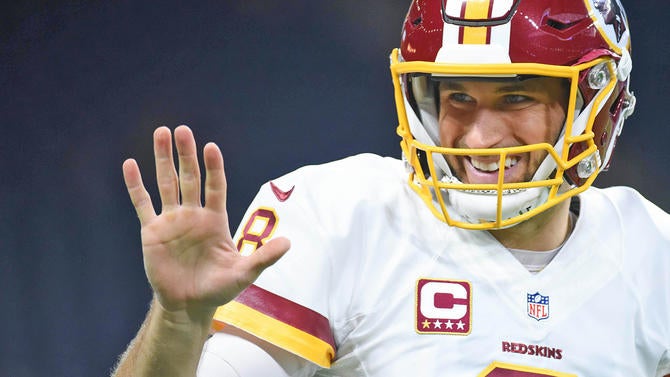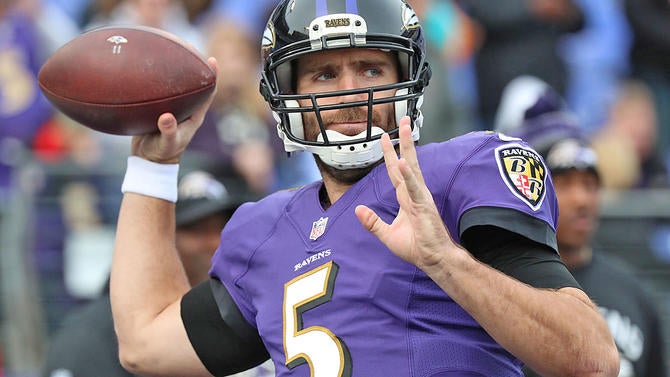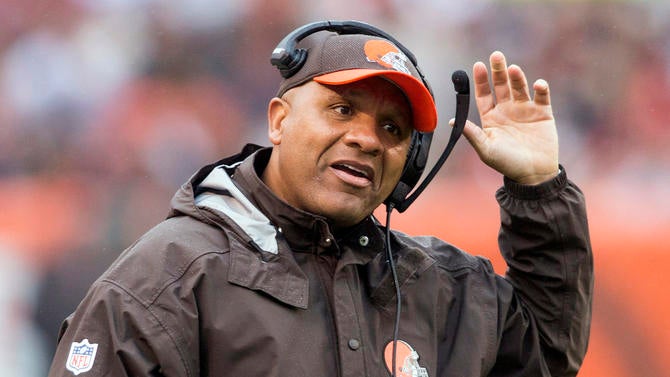Ideally, the NFL's highest paid player is the game's best player. Contracts don't necessarily work that way. There are several factors, including timing, willingness to use leverage and playing position that help determine the NFL's salary hierarchy.
Joe Flacco forced the Ravens to briefly make him the NFL's highest-paid player in 2013 after a stellar postseason during a contract year in which he was named Super Bowl XLVII MVP. Nobody was considering Flacco as an elite quarterback when he signed the deal.
Andrew Luck changed the NFL salary landscape last June when he signed a five-year, $122.97 million contract extension with the Colts. The 2012 first overall pick's $24.594 million average yearly salary was an 11.1 percent increase over the previous standard that Flacco's extension set earlier in the year. Luck's contract established new benchmarks in overall contract guarantees ($87 million), money fully guaranteed within 12 months of signing ($60M), three-year cash flow ($75M) and compensation for the first three new years on the deal($79.97).
Luck didn't advance the ball in the important contact metric of money fully guaranteed at signing. His $47 million tops Aaron Rodgers' quarterback best of $44.5 million but falls well short of the $59.955 million that the Dolphins fully guaranteed defensive tackle Ndamukong Suh at signing.
Kirk Cousins becoming the NFL's highest-paid player in the offseason is a ridiculous notion to many. But it's a realistic possibility and here are the three factors that could make it happen.
The franchise tag factor
It was a no-brainer for the Redskins not to meet Cousins' contract demands last offseason and let him play the 2016 season on his $19.953 million non-exclusive franchise tag. The Redskins had reservations about paying Cousins as an above-average starter, given his limited track record. Washington's reported best offer was $16 million per year with $24 million in guarantees. Although it wouldn't have been accepted, the Redskins weren't willing to raise their offer to match the four-year, $72 million deal that Brock Osweiler received in free agency from the Texans. Osweiler got $37 million fully guaranteed in the contract.
CBS Sports NFL Insider Jason La Canfora first reported a couple of weeks ago that the Redskins plan to franchise Cousins for a second time in 2017 if a long-term deal can't be reached before the beginning of March. Cousins would make $23,943,600 next season, which is 20 percent more than this year's tag. The 2017 tag would likely be the exclusive version, because the cost is expected to be practically the same as the non-exclusive one. An exclusive tag would prohibit Cousins from soliciting offer sheets from other teams.
A second franchise tag isn't an issue for the Redskins salary-cap wise. Assuming the 2017 salary cap is set in the $168 million neighborhood, the Redskins are expected to have more than $55 million of 2017 cap space.

Cousins would quickly sign a second franchise tender, just like he did this year, since it's fully guaranteed when accepted. Signing the tender wouldn't preclude the Redskins and Cousins from reaching an agreement before the July 15 deadline for franchise players to sign long-term.
A practical consequence of a second franchise tag is increased financial expectations. When a client is franchised, an agent typically uses the tag amount as a baseline or guide for a long-term deal. This means that Cousins' agent, Mike McCartney of Priority Sports, wouldn't consider anything less than $24 million per year for Cousins. A third franchise tag in 2018 at almost $34.5 million, a 44 percent increase over the 2017 figure, would be extremely cost-prohibitive for the Redskins.
The leverage factor
Cousins is erasing the concerns the Redskins had about him prior to this season by exceeding expectations with his improved play. It's the best bet a player has made on himself since Flacco.
Cousins was named the NFC's Offensive Player of the Month for November. He completed 72.4 percent of his passes (84 of 116) for 1,086 yards with eight touchdowns and no interceptions for a 124.4 passing rating during November.
The 2012 fourth-round pick is in the NFL's top 10 in several traditional statistical categories for quarterbacks. He is third in passing yards (4,045), fifth in completion percentage (67.5), sixth in passer rating (100.3), tied for ninth in touchdown passes (23) and second in yards per pass attempt (8.17).
Cousins is on pace to shatter the Redskins' single-season franchise record of 4,166 passing yards that he set in 2015. He is also flirting with becoming the sixth player to have a 5,000-yard passing season, which has only been done by Tom Brady, Drew Brees, Peyton Manning, Dan Marino and Matthew Stafford.
McCartney is going to make the Redskins pay for their reservations about Cousins if they want to keep him long-term. My understanding is Cousins was seeking a long-term deal averaging $20 million per year with $60 million in overall guarantees when talks last broke off. The days of the Redskins signing Cousins to that type of deal are long gone.

Cousins isn't under any obligation to give the Redskins a hometown discount to help maintain or improve the talent around him to become perennial playoff contenders, especially before signing his first lucrative long-term deal. Tom Brady's willingness to take less with the Patriots hasn't started a trend among NFL quarterback and superstars. The 2004 first-round quarterback draft class (Eli Manning, Philip Rivers and Ben Roethlisberger) signed market value extensions in 2015, which were their second big veteran contracts.
Cousins is practically in a no-lose situation provided he finishes the season healthy. Turning into Brock Osweiler to end the regular season won't undermine Cousins' leverage. Cousins taking the Redskins to the playoffs in back-to-back years won't be a necessity either for him to receive a big pay day. Getting the Redskins into the playoffs again and going on a Flacco-type run would be a game changer.
The first franchise tag put Cousins in a different salary stratosphere after making approximately $2.6 million on his four-year rookie contract. This allows for a hard-line stance in negotiations, especially before the March 1 deadline for the Redskins to franchise Cousins again. It's hard to imagine a scenario where a healthy Cousins signs for less than Luck before the Redskins must make a franchise tag decision.
The Redskins deciding Cousins' demands are so excessive that they let him test the open market would also be an ideal scenario for McCartney. It's in Cousins' favor that there are more teams than competent quarterbacks in the NFL and the 2017 quarterback draft class isn't as highly regarded as the passers in the last two NFL drafts.
Three teams to keep an eye on that will have an abundance of salary cap room in the unlikely event Cousins is an unrestricted free agent are the Bears, Browns and 49ers. The Jay Cutler era is expected to come to an end in Chicago. The Bears should have close to $65 million of cap room without the remaining four years of Cutler's contract on the books. Chicago could have particular appeal to Cousins because he is from the area.
The Browns, staring down an 0-16 season, really need to find a quarterback after passing on Carson Wentz this year by making a blockbuster pre-draft trade with the Eagles. Cleveland is projected to have close to $110 million of 2017 cap space, which is an unheard-of amount. Moving to the AFC North would be an easy transition for Cousins because Hue Jackson runs the same offensive scheme as the Redskins. The Browns also have some playmakers with tight end Gary Barnidge, rookie wide receiver Corey Coleman, running back Isaiah Crowell and impending free-agent wide receiver Terrelle Pryor.

San Francisco would become an intriguing situation if La Canfora's report that former Redskins head coach Mike Shanahan could join the 49ers in an executive or coaching capacity comes to life. The 49ers would be approaching $90 million of cap space with a divorce from Colin Kaepernick.
Above-average quarterbacks, like Cousins, or elite ones never hit the open market. It's conceivable that Cousins could command a multi-year contract in excess of $26.25 million per year with more than $90 million in guarantees -- with at least $60 million fully guaranteed at signing -- were he to become an unrestricted free agent. That's especially true considering some of signings that historically take place during the first wave of free agency and the way that teams consistently reward mediocre quarterback play.
The patience factor
Time would be on Cousins' side with a second franchise tag. There wouldn't any incentive for Cousins to sign a long-term deal before the July 15 deadline approached.
Derek Carr and Stafford, who are legitimate MVP candidates this season, will be entering contract years with the Raiders and Lions in 2017. An extension by at least one of two before the July franchise player deadline would be a favorable development for Cousins. Both players are likely to get at least $25 million per year on their next contracts. Since it is generally accepted that the top contracts are negotiated to be surpassed, McCartney would use these deals to push Cousins' salary to a higher level than would have been possible without them in the market place.
Carr and Stafford being considered as better players won't problematic. It didn't matter when Flacco became the league's highest-paid player over Drew Brees in 2013 and Rodgers earlier this year. The difference in ability and production between Flacco and the two quarterbacks he surpassed salary wise is much greater than with Cousins and Carr or Stafford. Cousins also won't be in a worse position if Carr and Stafford don't get deals in time to help him.
Playing on a second franchise tag wouldn't have nearly the same downside as playing under one this year. Cousins would likely get the benefit of doubt from other teams as a 2018 free agent even if he turned in a mediocre 2017 campaign because of his 2016 season. His realistic worst-case scenario if he did struggle in 2017 would be taking a deal that matches his previous contract demands of $20 million per year with $60 million in guarantees. But he'd be signing that deal after banking nearly $44 million playing on two franchise tags.
Continuing to show in 2017 that he hasn't reached his peak without a long-term contract in place could put Cousins in unchartered territory. $30 million per year with at least $100 million in guarantees from the Redskins wouldn't be out of the question at this juncture. I have no doubt Cousins would get it from somebody on the open market in 2018 under this scenario.





















